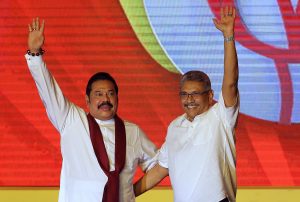Even as the mass demonstrations on the streets of Colombo calling for the resignation of President Gotabaya Rajapaksa and his elder brother, Prime Minister Mahinda Rajapaksa, are showing no signs of ending or easing, Sri Lanka’s opposition parties are exploring options to dislodge the duo from power.
They seem to have found unlikely allies – the president and the prime minister themselves.
The two have repeatedly said that they will not step down. However, a rift between them is said to be growing, which could work to the opposition’s advantage.
The tug-of-war between Sri Lanka’s two most powerful men comes at a time when the island is in the grip of a severe economic crisis triggered by rapidly depleting foreign exchange reserves. A shortage of food and fuel has caused enormous hardship to ordinary Sri Lankans, who are blaming the Rajapaksas for the crisis. Public anger against the Rajapaksas has never been so high.
Under pressure to resign, Gotabaya and Mahinda are scheming separately, each to sink the other to save his own seat. Both are working with loyalists to nudge the other out of power, in the hope that this will buy peace with the public and the political class.
According to a report in Daily Mirror, Gotabaya is mobilizing his supporters in the ruling Sri Lanka Podujana Party (SLPP) and among parliamentarians of other parties to support a planned no-confidence motion against the prime minister.
Meanwhile, Mahinda has been working towards tilting the current power balance away from the office of the president toward Parliament and the prime minister. “It is my belief that 19A [the 19th Amendment to the Sri Lankan Constitution] has to be revived with certain amendments as a short term solution” to the current political crisis, he told Parliament on April 19.
Since 1978, Sri Lanka has had an executive presidential system. In 2015, Parliament enacted the 19th Amendment to dilute the powers of the executive presidency.
After Gotabaya won the November 2019 presidential election and the Mahinda-led SLPP swept the general election in August 2020, they pushed for the scrapping of 19A. With the two-thirds majority they had in Parliament they were able to enact the 20th Amendment or 20A, which granted sweeping powers to the executive presidency and heightened immunity to the president’s office.
Now Prime Minister Mahinda wants the president’s wings clipped and his own power enhanced. Hence, his interest in bringing back 19A with “certain amendments.”
Incidentally, Mahinda’s call for clipping the powers of the presidency came a day after a rift with his younger brother came out in the open.
Apparently, there were differences between the two on the appointments to the new cabinet. Gotabaya’s preferences were reportedly not to Mahinda’s liking. Since the president’s choices prevailed, the miffed prime minister stayed away from the swearing-in of the new cabinet ministers. The following day, Mahinda recommended the revival of 19A.
The rift between the two brothers has only widened since.
While the Rajapaksa brothers are busy sniping at each other, their hold over power is weakening.
Following its sweeping win in the 2020 general elections, the SLPP along with its allies commanded a two-thirds majority in the 225-seat Parliament.
In March, the government lost its two-thirds majority. In early April, when around 40 SLPP parliamentarians quit the ruling dispensation to sit as an independent group, it lost its simple majority too. Soon after the entire cabinet, excluding the prime minister, resigned, leading to the president appointing a new cabinet.
Meanwhile, opposition parties, which have been more or less clueless over their next steps in response to the crisis, are slowly stirring out of their stupor.
On Thursday, the Samagi Jana Balwegaya (SJB), the country’s main opposition party, set in motion a constitutional amendment that seeks to do away with the country’s executive presidency. “We have handed over to the Speaker our proposal to abolish the executive presidential system and replace it with a system that reinforces constitutional democracy,” SJB leader Sajith Premadasa told Parliament.
The SJB has also been talking about a no-confidence motion against the government.
It lacks the numbers to successfully implement any of its grand plans. The SJB has only 70 seats in Parliament. It needs 113 votes to win the trust vote. It is unclear whether the 40 newly independent former SLPP legislators will support the no-confidence motion.
































